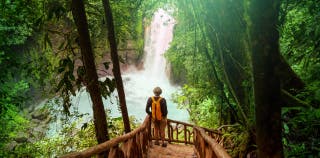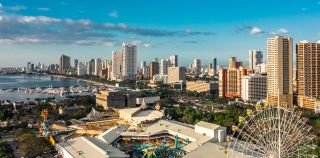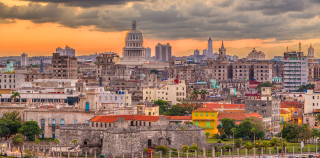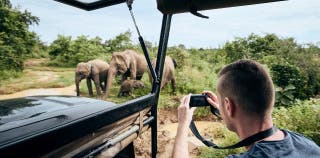- Since your U.S. health insurance doesn’t apply in Tanzania, it’s smart to consider getting travel medical and medical evacuation coverage for your trip, even though it’s not mandatory.
- A comprehensive travel insurance plan will also safeguard you from trip cancellations and interruptions, delays, lost baggage and other potential mishaps.
- According to our research, our top picks for travel insurance for Tanzania are from AXA, Tin Leg and IMG (skip ahead to see these plans).
- Based on our sales data, travel insurance for Tanzania costs around $35 per day.
- Try our online comparison tool to quickly compare different plans and find your ideal coverage.
On This Page
- Key takeaways
- Tanzania travel information & requirements
- What to consider when taking a trip to Tanzania
- Do I need travel insurance to visit Tanzania?
- What does travel insurance for Tanzania cover?
- What isn’t covered by travel insurance for Tanzania?
- How much does travel insurance for Tanzania cost?
- Tips for getting the best Tanzania travel insurance
- FAQ: Tanzania travel insurance
- Related topics
On This Page
- Key takeaways
- Tanzania travel information & requirements
- What to consider when taking a trip to Tanzania
- Do I need travel insurance to visit Tanzania?
- What does travel insurance for Tanzania cover?
- What isn’t covered by travel insurance for Tanzania?
- How much does travel insurance for Tanzania cost?
- Tips for getting the best Tanzania travel insurance
- FAQ: Tanzania travel insurance
- Related topics
Travel Insurance for Tanzania: Compare Your Coverage Options
Our top picks for the best tanzania travel insurance
Our top picks for travel insurance for Tanzania
AXA Assistance USA
Tin Leg
IMG
Tanzania travel information & requirements
| Query | Details |
|---|---|
| Tourist visa required for Americans | Yes |
| Visas available on arrival | Yes ($100 fee) |
| Passport requirements | One blank page, at least 6 months of validity beyond date of entry |
| Proof of onward travel required | Yes |
| U.S. health insurance accepted | No |
| Travel insurance requirements | None |
| Vaccine requirements | Yellow fever if you arrive from or transit through a country where the disease is endemic |
| Covid test required | No |
| Travel advisory level | Level 2: Exercise increased caution |
| Emergency services phone number | Ambulance: 112 Police: 111 |
| Language | Swahili, English |
| Local currency | Tanzanian shilling |
| Average 5-year exchange rate | 1 US dollar = 2,544.6 Tanzanian shilling |
What to consider when taking a trip to Tanzania
As you decide whether to buy travel insurance for Tanzania, keep the following factors in mind.
Trips to Tanzania are expensive
U.S. travel to Tanzania typically involves long flights, a tourist visa, hotel accommodations and tours. These costs can add up. According to Squaremouth, the average trip to Tanzania costs a whopping $13,580.79. With travel insurance, you have a way to recoup expenses if you have to cancel the trip or come back home early.
Traveling to Tanzania
When you travel to Tanzania from the USA, you can expect at least one flight connection. Most international flights arrive in one of three airports. From there, you may need to take additional domestic flights, cars, trains or boats to get to your final destination. This type of multi-leg journey increases the chance of expensive delays; travel insurance helps you cover surprise costs.
Attractions in Tanzania
Tanzania is packed with attractions — you can spend weeks hiking up Mount Kilimanjaro or taking game drives through Serengeti National Park. Many popular excursions take you far from medical services, particularly on the islands of Zanzibar. If you want to visit the Hadzabe people, you’ll need to journey to the shores of Lake Eyasi; wildlife-watching at the Ngorongoro Crater involves a long drive. A standard or safari travel insurance policy with a high medical evacuation limit can cover the cost of emergency flights.
Thinking about trying Tanzania’s adventure sports? Whether you want to watch the Great Migration from a hot air balloon or dive with whale sharks near Mafia Island, you may need additional coverage.
Do I need travel insurance to visit Tanzania?
Tanzania does not require American tourists to purchase travel insurance. However, given the long travel times, remote attractions, scattered medical facilities and risk of injury, it’s a good idea to purchase a policy.
Risk of terrorism and crime
While Tanzania is relatively stable, surrounding countries can present a risk. The borders with Burundi and Mozambique tend to be volatile, which is a concern if you’re visiting Nyerere National Park, Lake Malawi or the Kigosi Game Reserve. Terrorism is also a possibility. Crime is another risk, particularly for LGBTIQA+ travelers. If your trip is affected by terrorism, an attack or civil unrest, a travel insurance policy can help reimburse your costs.
Risk of pickpockets and tourist scams
Robberies are a regular occurrence in Tanzania; criminals snatch bags, mug travelers on the street and hold up cars. Don’t carry valuables or large amounts of cash, and avoid unmarked transportation. If you’re carrying expensive cameras or other gear, look for an insurance policy with ample coverage for personal items — it can help you pay for lost, damaged or stolen items if you’re robbed on the beach in Zanzibar or carjacked in Dar es Salaam.
Insect bites, illness and disease
According to the CDC, bugs in Tanzania carry a range of dangerous diseases.
These diseases include:
- Malaria
- Yellow fever
- Zika
- Dengue fever
- Filariasis
- Leishmaniasis
- African sleeping sickness
Many of these conditions can’t be prevented with a vaccine or medication, so it’s important to wear insect repellent, cover your skin and use mosquito nets. HIV and AIDS are also a risk. According to USAID, About 5% of the country’s adult population is HIV positive.
Altitude sickness is another common issue. It can happen at elevations of 8,000 feet above sea level or higher, according to the CDC. Given that Mount Kilimanjaro stands 19,340 feet tall, this illness is a real possibility. If you fall ill during your trip, a travel insurance policy can pay for medical care and emergency transport services.
Adventure activities
Many of Tanzania’s most popular attractions involve adventure sports — many of which aren’t covered by traditional travel insurance policies. If you’re scuba diving in Lake Tanganyika, you might need to purchase add-on coverage. That way, you can enjoy the adrenaline rush knowing that any medical bills or evacuations will be covered.
Severe weather and natural disasters
The rainy season in Tanzania, which runs from March through May and October through December, can increase the risk of torrential rain, flash floods and landslides. If you’re traveling during these periods, look for travel insurance with coverage for weather-related interruptions, delays and cancellations.
What does travel insurance for Tanzania cover?
There are many different types of travel insurance for Tanzania. Before you buy, it’s important to understand the different coverage options and how they suit your travel plans.
Trip cancellation insurance
Cancellation coverage reimburses your prepaid costs if you can’t take a planned Tanzania trip. If you catch COVID-19 right before you leave for a Tanzania safari, the policy helps ensure that you don’t lose out on deposits and prepaid tours. Other covered reasons could include a traveling companion’s injury, a terrorist attack at your destination or natural disasters that disrupt your plans.
Cancel for any reason insurance
Worried that a work project or a family event might force you to cancel your Tanzania vacation? Cancel for any reason (CFAR) insurance helps you get some of your prepaid, non-refundable costs back — usually, 75% — if the situation isn’t covered under the base policy.
Trip interruption insurance
If you need to come home mid-vacation, trip interruption coverage helps pay for the costs of the remaining portion of the vacation. This might happen if you catch dengue fever from a mosquito bite in Dar es Salaam or if a cyclone storm surge hits Zanzibar before you arrive.
Trip delay insurance
Trip delay coverage pays you back for unexpected costs you incur if a flight or a train is delayed or canceled — a distinct possibility on a multi-leg journey to Tanzania. If your flight is late and you miss a connection in Europe, this type of insurance might reimburse you for meals and a night in an airport hotel.
Travel medical insurance
Medical coverage helps pay your medical bills if you get sick or hurt while traveling in Tanzania. If you fall out of the safari vehicle while looking for the “big five” in the Serengeti, you won’t need to bear the cost of setting your broken arm. Squaremouth recommends a policy with at least $100,000 in emergency medical insurance for Tanzania.
Medical evacuation insurance
This type of insurance pays for medical transportation in an emergency. According to Squaremouth, you need a minimum of $250,000 in medical evacuation coverage for Tanzania. If you’re visiting remote or isolated areas, look for companies that offer up to $1 million in coverage. That way, the provider will foot the bill if you need a helicopter to the hospital while visiting chimpanzees in Mahale Mountains National Park.
Adventure activity coverage
Adventure coverage expands your standard insurance to include certain high-risk activities. It’s typically available as an add-on to a base plan and can be useful when your itinerary includes activities such as climbing the active volcano Ol Doinyo Lengai in northern Tanzania.
Baggage insurance
With all the connections involved in a trip to Tanzania, baggage insurance is a must — it helps replace your belongings if your bags are lost or delayed. You can get reimbursed for clothes and essentials if your suitcase doesn’t make it to Zanzibar.
Live assistance services
When an emergency happens in Tanzania, live travel assistance can help you find a solution.
Common services include:
- Referring you to a nearby doctor
- Conveying messages to your loved ones
- Negotiating billing with hospitals
- Planning a medical evacuation
- Transferring cash to you in an emergency
- Translating with medical staff who don’t speak English
- Providing legal help
- Replacing a lost or stolen passport
- Helping you find replacements for prescriptions
This service can be a lifesaver when you’re far from home. If your bag is stolen in Stone Town, the insurance provider might arrange an emergency cash transfer to tide you over.
What isn’t covered by travel insurance for Tanzania?
While every plan is different, travel insurance providers usually exclude:
- Non-emergency medical care
- High-risk activities
- Excessive drug or alcohol use
- Self-harm
- Pregnancy (except for complications)
- Illnesses or natural disasters that occur before you buy a policy
- Illegal activities
How much does travel insurance for Tanzania cost?
Individuals who purchased travel insurance for Tanzania via our platform spent an average of $811 for a 23-day trip. This data suggests that coverage costs approximately $35 per day.
Prices for Tanzania travel insurance can be different for every traveler. To give you more insight, we gathered quotes for four popular travel insurance providers. All quotes meet Squaremouth’s guidelines of having at least $100,000 in emergency medical coverage and at least $250,000 in medical evacuation coverage.
Our quotes use these details:
- Age: 50 years old
- State of residency: California
- Destination: Tanzania
- Trip Length: 14 days
- Time of trip: August 2024
- Trip cost: $8,000
This first example shows our quotes for basic travel insurance. Prices span from approximately $2 to $5 per day.
Example Where Plan Doesn’t Reimburse the Full Trip Cost
| Provider | Plan Name | Plan Cost | Cancellation / Interruption Limits | Medical / Medevac Limits |
|---|---|---|---|---|
| Tin Leg | Luxury | $40 | $0 / $750 | $100K / $250K |
| Trawick International | Safe Travels Journey | $38 | $0 / $0 | $150K / $500K |
| Seven Corners | Trip Protection Basic | $25 | $0 / $1K | $100K / $250K |
| AXA Assistance USA | Gold | $68 | $0 / $1K | $100K / $500K |
The next table shows quotes for comprehensive travel insurance, which includes coverage for trip cancellations and interruptions. Prices range from approximately $26 to $54 per day.
Example Where Plan Does Reimburse the Full Trip Cost
| Provider | Plan Name | Plan Cost | Cancellation / Interruption Limits | Medical / Medevac Limits |
|---|---|---|---|---|
| Tin Leg | Luxury | $757 | $8K / $12K | $100K / $250K |
| Trawick International | Safe Travels Journey | $418 | $8K / $10K | $150K / $500K |
| Seven Corners | Trip Protection Basic | $429 | $8K / $8K | $100K / $250K |
| AXA Assistance USA | Gold | $359 | $8 / $12K | $100K / $500K |
Various factors influence the cost of your Tanzania travel insurance, such as:
- Traveler ages
- Trip length
- Trip to Tanzania cost
- Date of premium payment relative to first deposit
- Whether you have primary health insurance
Therefore, your final cost might not match the quoted prices above. For accurate pricing, it’s best to get a personalized quote.
Tips for getting the best Tanzania travel insurance
Use these tips to help you find the best available travel insurance for Tanzania:
Buy insurance immediately after you make your first deposit.
Travel insurance covers unexpected events. Waiting to buy coverage raises the risk of those events becoming expected, which could mean you can’t get your money back.
Make sure the policy covers your planned activities.
Engaging in adventurous activities, such as mountain climbing, may require additional coverage. Likewise, traveling to remote locations warrants consideration for increased medical evacuation coverage. Also, if you’re going to remote places, you may want to consider getting more medical evacuation coverage.
Shop around and compare your options.
You can use an online comparison tool to look at different options all at once. Comparing various options side by side will help you make an informed decision and find the best deal for your needs.
FAQ: Tanzania travel insurance
Do I need travel insurance to visit Tanzania?
You’re not required to have travel insurance to visit Tanzania, but it’s a good idea to have a policy since your U.S. health insurance won’t work in this country.
Is it safe to visit Tanzania?
Tanzania is generally considered a safe country. However, because robberies are common, you should travel with caution and avoid carrying valuables.
Is travel medical insurance for my trip to Tanzania worth it?
Travel medical insurance for Tanzania is worth it, especially if you’re planning adventure activities. Travel insurance for Zanzibar can cover your medical costs if you break a leg while exploring the Old Fort.
Can I buy travel insurance after I’ve started my trip to Tanzania?
Most companies require you to buy single-trip travel insurance policies before you leave the country. However, a few providers allow you to buy medical coverage after the trip begins.
Does Tanzania travel insurance cover COVID?
Many travel insurance policies include COVID-19 as a covered illness.






























































